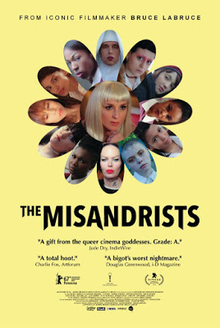The Misandrists
The Misandrists[edit | edit source]
The Misandrists is a 2017 film directed by Bruce LaBruce. The film is a provocative exploration of themes related to feminism, gender, and sexuality. It is known for its satirical and subversive take on radical feminist movements.
Plot[edit | edit source]
The film is set in a remote feminist commune where a group of women, led by the charismatic Big Mother, are plotting a revolution to overthrow the patriarchy. The story begins when a young man, injured and on the run, stumbles upon their secluded hideout. The women decide to take him in, which leads to a series of events that challenge their beliefs and the dynamics within the group.
Themes[edit | edit source]
The Misandrists delves into several complex themes:
- Feminism and Radicalism: The film portrays a radical feminist group that seeks to dismantle patriarchal structures. It explores the extremes of feminist ideology and the potential for internal conflict.
- Gender and Identity: Through its characters, the film examines the fluidity of gender and the construction of identity. It challenges traditional gender roles and highlights the diversity of feminist thought.
- Sexuality: The film does not shy away from explicit content, using it to critique societal norms and to explore the intersection of sexuality and power.
Production[edit | edit source]
The Misandrists was filmed in Germany and features a predominantly female cast. Bruce LaBruce, known for his work in queer cinema, brings his unique style to the film, blending elements of camp, satire, and political commentary.
Reception[edit | edit source]
The film received mixed reviews from critics. Some praised it for its boldness and originality, while others criticized it for its controversial subject matter and explicit content. Despite the divided opinions, The Misandrists has been noted for sparking discussions on feminism and gender politics.
Related pages[edit | edit source]
Search WikiMD
Ad.Tired of being Overweight? Try W8MD's physician weight loss program.
Semaglutide (Ozempic / Wegovy and Tirzepatide (Mounjaro / Zepbound) available.
Advertise on WikiMD
|
WikiMD's Wellness Encyclopedia |
| Let Food Be Thy Medicine Medicine Thy Food - Hippocrates |
Translate this page: - East Asian
中文,
日本,
한국어,
South Asian
हिन्दी,
தமிழ்,
తెలుగు,
Urdu,
ಕನ್ನಡ,
Southeast Asian
Indonesian,
Vietnamese,
Thai,
မြန်မာဘာသာ,
বাংলা
European
español,
Deutsch,
français,
Greek,
português do Brasil,
polski,
română,
русский,
Nederlands,
norsk,
svenska,
suomi,
Italian
Middle Eastern & African
عربى,
Turkish,
Persian,
Hebrew,
Afrikaans,
isiZulu,
Kiswahili,
Other
Bulgarian,
Hungarian,
Czech,
Swedish,
മലയാളം,
मराठी,
ਪੰਜਾਬੀ,
ગુજરાતી,
Portuguese,
Ukrainian
Medical Disclaimer: WikiMD is not a substitute for professional medical advice. The information on WikiMD is provided as an information resource only, may be incorrect, outdated or misleading, and is not to be used or relied on for any diagnostic or treatment purposes. Please consult your health care provider before making any healthcare decisions or for guidance about a specific medical condition. WikiMD expressly disclaims responsibility, and shall have no liability, for any damages, loss, injury, or liability whatsoever suffered as a result of your reliance on the information contained in this site. By visiting this site you agree to the foregoing terms and conditions, which may from time to time be changed or supplemented by WikiMD. If you do not agree to the foregoing terms and conditions, you should not enter or use this site. See full disclaimer.
Credits:Most images are courtesy of Wikimedia commons, and templates, categories Wikipedia, licensed under CC BY SA or similar.
Contributors: Prab R. Tumpati, MD

